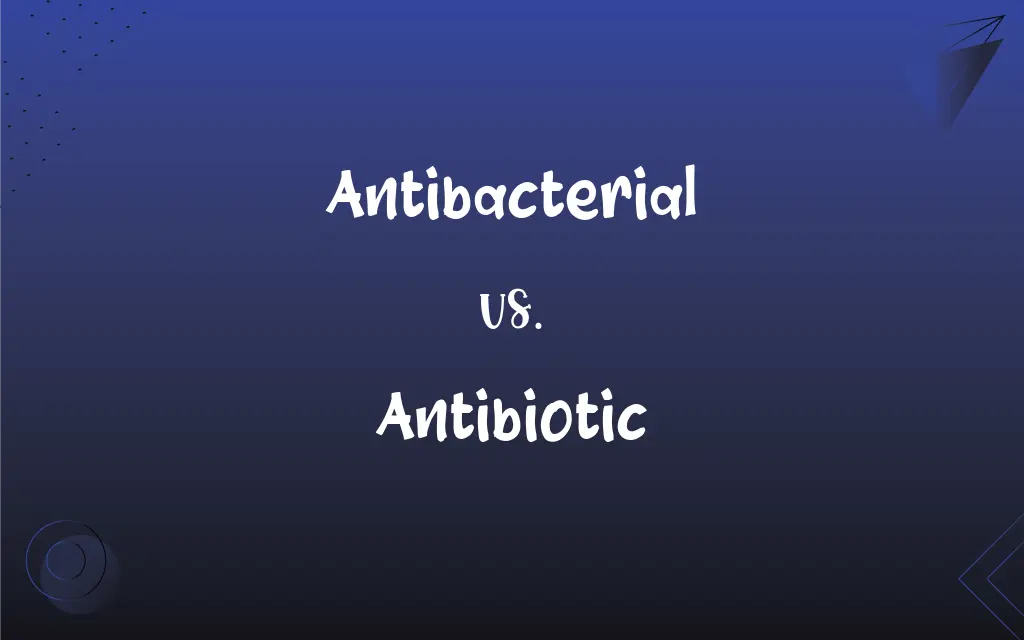Antibacterial vs. Antibiotic: What's the Difference?
Edited by Janet White || By Harlon Moss || Updated on October 16, 2023
Antibacterial targets bacteria specifically; antibiotic kills or inhibits growth of microorganisms, including bacteria.

Key Differences
Antibacterial is a term denoting substances or agents that destroy bacteria or suppress their growth, while antibiotic refers to substances that kill or inhibit the growth of various microorganisms, including bacteria.
Antibacterial agents are commonly used in soaps, lotions, and household products to prevent bacterial contamination; antibiotics are medicines prescribed by doctors to treat infections caused by microorganisms.
While antibacterial products primarily focus on eliminating harmful bacteria, antibiotics can target a wider range of pathogens, including certain fungi and parasites.
The term "antibacterial" is more specific in its scope, aiming solely at bacteria. Conversely, "antibiotic" encompasses a broader range of action against multiple microorganisms.
Overuse of antibacterials can lead to resistant bacteria, similar to how overuse of antibiotics can cause antibiotic-resistant strains.
ADVERTISEMENT
Comparison Chart
Definition
Agents that destroy or inhibit bacterial growth
Substances that kill or inhibit growth of microorganisms
Common Uses
Soaps, lotions, household products
Medications to treat infections
Target Range
Specifically against bacteria
Bacteria, some fungi, and certain parasites
Resistance Issues
Can lead to antibacterial-resistant bacteria
Can lead to antibiotic-resistant strains
Application
External use in products
Mostly internal use as medicines
ADVERTISEMENT
Antibacterial and Antibiotic Definitions
Antibacterial
It pertains to preventing bacterial growth.
The antibacterial soap ensured a reduction in harmful bacteria on hands.
Antibiotic
Antibiotic is a medicine combatting microorganisms.
The doctor prescribed an antibiotic to treat the infection.
Antibacterial
Often used in everyday hygiene products.
This dishwashing liquid has an antibacterial formula to ensure clean dishes.
Antibiotic
Used in treating bacterial, fungal, and some parasitic infections.
For her throat infection, she was given a specific antibiotic.
Antibacterial
Antibacterial denotes something that combats bacteria.
Many hand sanitizers claim to have antibacterial properties.
Antibiotic
Can target a broad or narrow range of pathogens.
This antibiotic is broad-spectrum, affecting many types of bacteria.
Antibacterial
Refers to substances that act against bacteria.
The antibacterial coating on the device helped reduce bacterial contamination.
Antibiotic
Developed from living organisms or synthesized.
Penicillin, an antibiotic, was discovered from a mold.
Antibacterial
Specifically targets bacteria, not other microorganisms.
The antibacterial agent was effective against certain bacteria but not against fungi.
Antibiotic
Pertains to inhibiting or killing microorganisms' growth.
The antibiotic worked by halting the bacteria's reproduction.
Antibacterial
Destroying or inhibiting the growth of bacteria.
Antibiotic
A substance, such as penicillin or erythromycin, produced by or derived from certain microorganisms, including fungi and bacteria, that can destroy or inhibit the growth of other microorganisms, especially bacteria. Antibiotics are widely used in the prevention and treatment of infectious diseases.
Antibacterial
An antibacterial substance.
Antibiotic
Of or relating to antibiotics.
FAQs
What is antibacterial?
It refers to agents or substances that destroy or inhibit bacterial growth.
Do antibiotics only come in pill form?
No, they can be pills, creams, injections, and more.
Are all antibacterials used as medicines?
No, many are used in everyday products like soaps and lotions.
And antibiotic?
It denotes substances that kill or inhibit the growth of microorganisms, including bacteria.
How do I know if I need an antibiotic?
A healthcare professional can determine the need based on symptoms and diagnosis.
Can antibiotics target organisms other than bacteria?
Yes, some antibiotics also target fungi and certain parasites.
Do antibacterials kill all bacteria?
No, they target specific harmful bacteria but might not eliminate all.
How do antibiotics work?
They either kill microorganisms or inhibit their growth.
Can overusing antibacterials cause resistance?
Yes, it can lead to antibacterial-resistant bacteria.
Why aren't viruses affected by antibiotics?
Viruses have a different structure and replication method, so antibiotics aren't effective.
Should I always finish my antibiotic course?
Yes, to ensure all harmful bacteria are eliminated and reduce resistance risks.
Can antibacterial agents be natural?
Yes, some natural substances have antibacterial properties.
Are there side effects to antibiotics?
Yes, potential side effects vary by antibiotic type.
Can I buy antibiotics over the counter?
In the U.S., antibiotics require a prescription.
How are antibiotics developed?
They can be derived from living organisms or synthesized in labs.
When should I use antibacterial products?
They're useful when there's a risk of bacterial contamination.
Is antibiotic resistance a concern?
Absolutely, it's a major global health concern.
Are antibacterial products safe for daily use?
While often safe, excessive use might lead to resistance or harm beneficial bacteria.
Can I use an antibiotic cream as an antibacterial?
While it may have antibacterial properties, it's best to use as directed.
Are there alternatives to antibiotics?
In some cases, other treatments or preventive measures might be recommended.
About Author
Written by
Harlon MossHarlon is a seasoned quality moderator and accomplished content writer for Difference Wiki. An alumnus of the prestigious University of California, he earned his degree in Computer Science. Leveraging his academic background, Harlon brings a meticulous and informed perspective to his work, ensuring content accuracy and excellence.
Edited by
Janet WhiteJanet White has been an esteemed writer and blogger for Difference Wiki. Holding a Master's degree in Science and Medical Journalism from the prestigious Boston University, she has consistently demonstrated her expertise and passion for her field. When she's not immersed in her work, Janet relishes her time exercising, delving into a good book, and cherishing moments with friends and family.































































